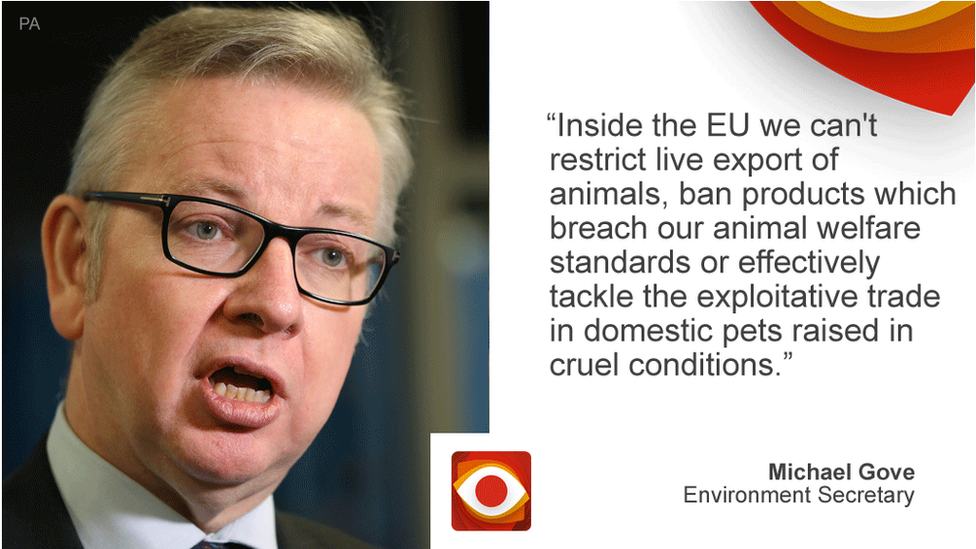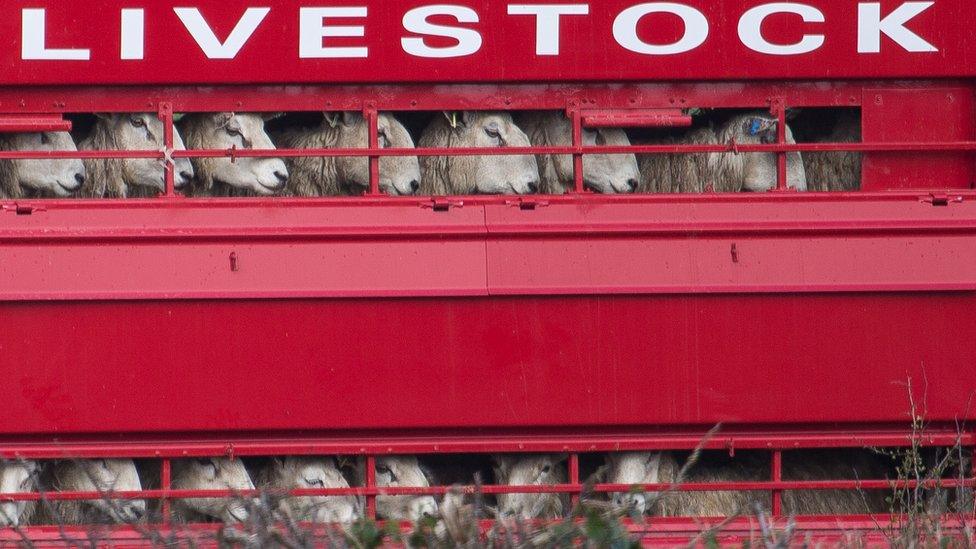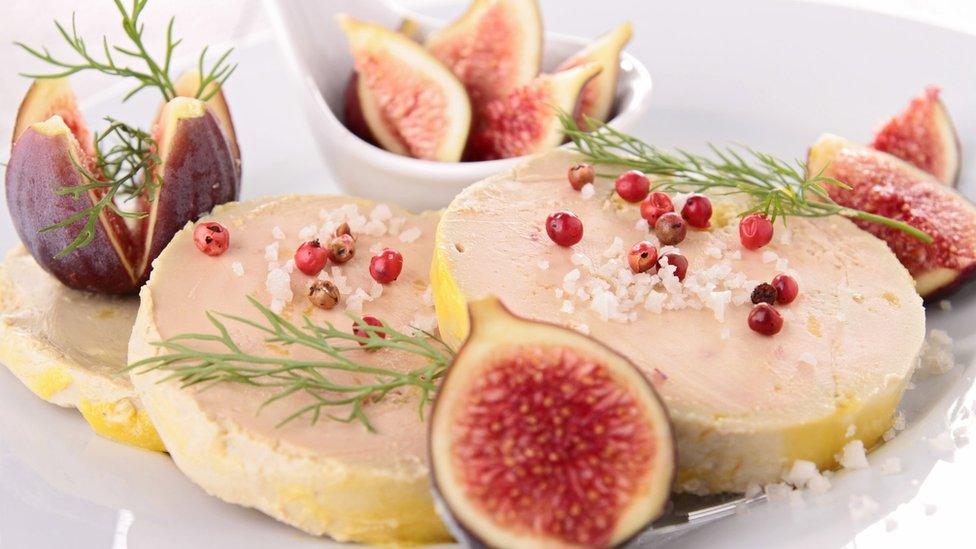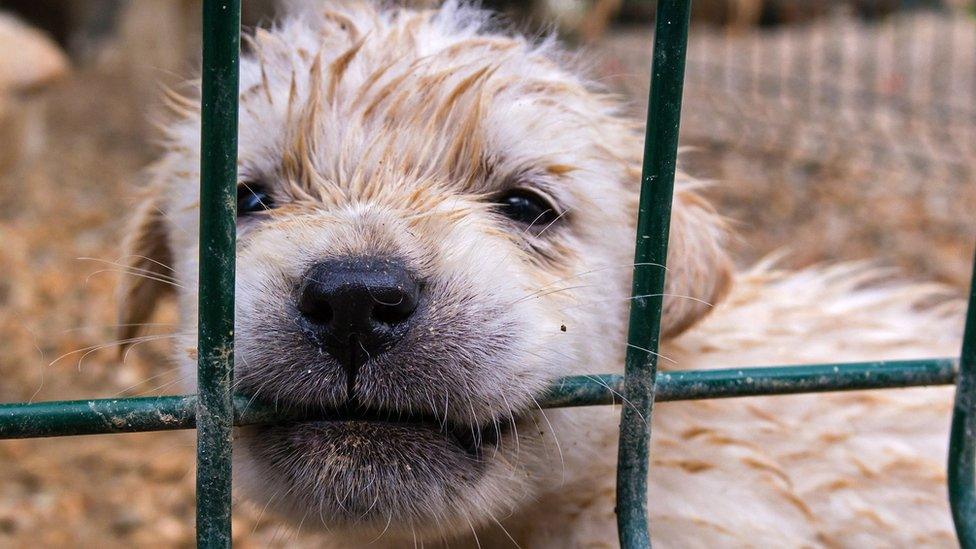Brexit: Does the EU stop the UK improving animal welfare?
- Published

The claim: Secretary of State for Environment, Food and Rural Affairs Michael Gove said in a recent tweet that the EU prevents the UK from restricting live export of animals, from banning products which breach the UK's animal welfare standards and from tackling the exploitative trade in domestic pets raised in cruel conditions.
There are three claims in Mr Gove's tweet - let's take them one by one:
Exporting live animals
The EU puts a number of restrictions on exporting live animals for slaughter or further fattening, such as ensuring adequate space, and providing food, water and rest, which all EU countries have to abide by. They were implemented in the UK in 2007.
Member countries are entitled to take stricter measures, if they wish - the EU welfare standards are a minimum all countries have to follow.
If the UK wanted to put further restrictions on live animal exports, it could do so while it is still in the EU.
But if it wanted to fully ban them, it would not be allowed to do so under the current EU single market rules.
Will the government ban such exports after Brexit?
The Department for Environment, Food and Rural Affairs (Defra) officials say they are considering all options.

Even after the UK leaves the EU, a ban on the export of live animals could be challenged under World Trade Organization (WTO) rules.
Export bans are prohibited by the WTO, but bans that protect endangered species and animal welfare, including ensuring that animals are not killed inhumanely, are allowed. So, there is a basis for challenging a ban under WTO, but there would also be a basis for defending it.
There is a private member's bill being put forward by Conservative MP Theresa Villiers that would ban live exports "for slaughter or fattening, and for connected purposes", but it stands little chance of becoming law without government support.
Reality Check verdict: Mr Gove is wrong to say that the EU prevents the UK from restricting the live export of animals, but the rules of the single market do prevent the UK from banning such exports altogether. If the UK were to implement its own ban after Brexit, that could be challenged at the World Trade Organization but it's not clear what the outcome would be.

Animal welfare standards
The EU has a wide range of animal welfare laws the UK has to abide by. These include consumer-information law, such as the labelling of eggs from battery hens.
It also regulates the use of animals in research, and it bans cosmetics tested on animals.
On top of these laws, individual countries can set their own animal welfare standards as long as they do not affect the operation of the EU's single market (in the UK, the issue is devolved).
For example, the UK, as well as most other EU countries, has domestic legislation that prohibits production of foie gras on animal welfare grounds.
Belgium, France, Hungary, Spain and Bulgaria do not prohibit the production and under the EU principle of free movement of goods, the UK is unable to ban the import of foie gras.

Foie gras is traditionally eaten at Christmas in France
Would the UK government impose a foie gras ban after Brexit?
We don't know - there has been no concrete proposal on this.
Reality Check verdict: Mr Gove is right to say that products that do not comply with domestic welfare legislation cannot be banned in the UK while it is part of the EU's single market.
If the government decided after Brexit to ban those products, such a decision could be challenged at the WTO.

Exploitative trade in pets
Mr Gove says EU rules on the pet travel scheme restrict the UK's ability to crack down on puppy smuggling.
The EU pet travel scheme enables the owners of dogs, cats and ferrets to move freely between EU countries with their pets, providing their pet is micro-chipped, has a pet passport, has been vaccinated against rabies and, in the case of dogs, treated for tapeworm.
Pets have to be at least 15 weeks of age before they can travel, and one person can travel with up to five pets.
Pet passports are issued by EU countries and a short list of other countries, external such as Norway, Iceland and Switzerland.
However, the charity Dogs Trust, in its report on puppy smuggling, external, says the EU pet travel scheme is abused by gangs in Hungary, Poland, Lithuania and elsewhere, who take puppies as young as four weeks from their mothers and transport them hundreds of miles in poor conditions to British ports, often with little food and water, to be sold in the UK.

The UK is a particularly attractive target for puppy smugglers because of the relatively high prices that some breeds command.
If cats, dogs or ferrets are travelling between EU countries to be sold, additional conditions have to be met,, external including that the animals have to come from registered businesses that comply with animal welfare standards.
Currently the UK has to abide by the terms of the pet travel scheme.
Individual governments are responsible for catching and punishing those who abuse the system. The UK is free to tighten these measures now (and after Brexit).
This week the UK government published a new draft law that would increase the maximum sentence for the most serious animal cruelty to five years in England and Wales, bringing it in line with Northern Ireland. The Scottish government also says it is committed to increasing the maximum penalty to five years.
Reality Check verdict: Mr Gove's tweet suggests there is nothing more the UK can do to tackle the exploitative trade in domestic pets as long as it stays in the EU. In fact the government already has the right to impose more severe punishments on those who abuse the system. Outside the EU, though, it could also introduce stricter rules for importing puppies from other member states. As ever, what happens after Brexit is a matter for negotiation.


